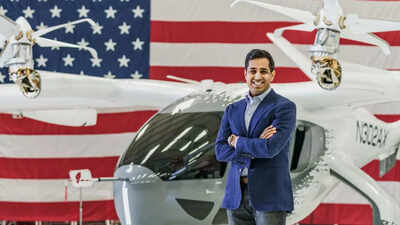Archer Aviation, a prominent California-based electric air taxi company with backing from industry giants such as Boeing, United Airlines, and Stellantis, has ambitious plans to introduce urban air mobility (UAM) services in Indian cities before the close of this decade. Their electric vertical takeoff and landing (eVTOL) vehicle, named Midnight, designed for a pilot and four passengers and offering a range of approximately 150 kilometers, is slated to commence commercial operations in the United States by 2025. Nikhil Goel, Archer's Chief Commercial Officer of Indian descent, envisions India as a significant UAM market. Besides deploying their eVTOLs in the country, Archer is also considering local production to reduce costs, ensuring affordability for urban air travel.
In densely populated cities like Bengaluru, Delhi, and Mumbai, where countless commuters spend hours stuck in traffic daily, eVTOLs have the advantage of operating from rooftops and parking structures. Traditional helicopter rides can cost hundreds of US dollars, but Archer aims to offer eVTOL flights at less than half that cost right from the outset, as stated by Goel during a phone conversation with ICCBizNews in California. Several other companies are also planning to introduce UAM services in India over the next few years.
Goel, who initiated his career at NASA, where he contributed to the Ares rocket project, subsequently led Uber's emerging market division with a specific focus on India. He also co-founded Uber Elevate, the company's Urban Air Mobility (UAM) branch, which was acquired by another company in 2020. Using Bengaluru, a city notorious for its excruciating traffic, as an example, he illustrated the advantages of UAM: "The city center and the airport are approximately 33 kilometers apart. While traveling by road can be time-consuming, an electric taxi can cover the distance in just 10-15 minutes. Initially, the cost per passenger will be around $100 or roughly Rs 8,000, but this is expected to decrease to approximately $35 or about Rs 3,000, which is comparable to the fares offered by services like Uber or Ola.
As the supply chain, including component manufacturing and final assembly, shifts to India, production costs will decrease further. Additionally, the emergence of autonomous vehicles that do not require a pilot should reduce fares even more, possibly as low as $20 for the same airport trip, or approximately Rs 1,500. It's worth noting that passengers will be allowed to bring carry-on luggage on board the eVTOLs, but larger checked bags may not be accommodated.
"At Uber, I played a significant role in expanding the business in India and spent a substantial amount of time in the country. India has the potential to become the world's largest UAM market. There is a tremendous opportunity to transition from spending hours in traffic in cars to direct UAM services. We have ambitious plans to establish a substantial presence in India. I had the privilege of meeting Prime Minister Modi in 2019, during which I presented our vision for urban air mobility in the country," mentioned Goel, who was born in the United States. When asked about the timeline for their operations in India, he stated, "I can't envision a scenario where we are not operational in several Indian cities sooner rather than later, possibly by the end of this decade. Shifting the supply chain to India makes a lot of sense to reduce operating costs."
Archer's objective is to secure certification from the U.S. aviation regulator within the coming year for their eVTOL, Midnight. Subsequently, they aim to commence commercial operations in 2025. Following this, between 2025 and 2028, Archer plans to significantly increase production, targeting an annual output of 2,000 units. Beyond this phase, the company envisions transitioning into high-volume manufacturing, possibly for autonomous air taxis.
Goel's association with Archer began in 2020 when he joined as an advisor and investor. In 2023, he assumed the role of Chief Commercial Officer. His career has spanned diverse roles at NASA, Google, Microsoft, McKinsey, and Uber, among other organizations. Regarding Archer's funding, Goel shared, "Archer has amassed approximately $1.2 billion in investments to date. Major contributors include United, which not only made equity investments but also placed a substantial order for 200 eVTOLs valued at $1 billion (Rs 8,000 crore) with an option to acquire an additional 100. Boeing is actively involved, contributing autonomous technology for our next-generation eVTOLs. Stellantis, an Amsterdam-based automotive manufacturing company formed by merging Italian-American Fiat Chrysler and the French PSA Group, is also an investor, contributing expertise in high-volume manufacturing best practices." Archer and United have jointly announced their inaugural route, connecting Downtown Manhattan and Newark Liberty International Airport.
Interestingly, Boeing is actively working on its own eVTOL named Wisk, which the aerospace giant claims will be the "world's inaugural self-piloted, fully electric, four-passenger air taxi." While the realization of autonomous air taxis may still be some time off, potentially towards the latter part of this decade, piloted eVTOLs, like the ones Archer is currently developing, have their sights set on commencing operational service within the next two years.





.jpg)
